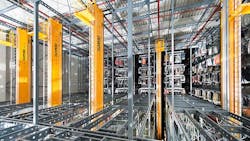Chinese Owner is Asset for This German Firm Dodging Politics
The head of forklift maker Kion Group AG has some advice for Germany: Don’t judge potential acquirers by their passports.
Amid political hand-wringing over Chinese takeovers of German companies, Chief Executive Officer Gordon Riske said the nationality of an investor shouldn’t determine how an approach is viewed. Kion has benefited from shareholder Weichai Power Co. Ltd. of China, which holds a 40% stake, he said.
“The Chinese typically take a very long view of things,” Detroit-born Riske said in an interview on Monday. This allows a lot of businesses to “make healthier decisions” about their strategy and endure less quarterly pressure for results.
China’s quest for German engineering prowess, displayed in a raft of acquisitions targeting small and medium-sized businesses known as Mittelstand, has sparked political concerns about foreign ownership. Riske, 59, is himself no stranger to international takeovers after completing a $2.1 billion acquisition of U.S. warehouse outfitting company Dematic the week before Donald Trump’s Nov. 8 presidential election victory.
Record Acquisitions
“If you neglect 25% of the market, chances are over time you’re going to be wiped away,” the CEO said in the interview, referring to the portion of the global forklift market located in China. Diesel-engine maker Weichai has boosted Kion’s access to the Chinese market, he said.
Chinese companies have announced or completed German acquisitions worth a record 11.3 billion euros (US$12 billion) this year, almost eight times the level of 2015, according to data compiled by Bloomberg. Last month, the German government started reviews of two of the planned takeovers, one for semi-conductor equipment maker Aixtron SE and the other for a division of Osram Licht AG. Tensions among Chancellor Angela Merkel’s ministers were triggered by this year’s purchase by China’s Midea Group Co. of robot maker Kuka AG.
For Kion, a maker of warehouse equipment ranging from traditional tools like forklifts to cutting edge self-driving vehicles, and other German companies, the sheer size of the Chinese market makes alliances crucial for business development, Riske said.
Economy Minister Understands
Deals are also important for German exports, something Economy Minister Sigmar Gabriel understands “better than many others in the government,” he said. The minister has been critical of China for not opening its own borders to foreign investment.
Weichai bought its original 25% stake in Wiesbaden, Germany-based Kion from KKR & Co. and Goldman Sachs Group Inc. just before the company was listed in 2013. Riske took the helm shortly after German industrial gas giant Linde AG sold its forklift assets to the buyout pair in 2006 for 4 billion euros. Dematic also emerged from under the wing of a German giant that same year when Siemens AG sold it to Triton Advisers Ltd.
Kion shares fell 0.6% Wednesday to 53.54 euros in Frankfurt, giving the company a market value of 5.8 billion euros.
With factories scattered around the globe, Kion has found itself more than once on the firing line, including a 2011 confrontation with unions in France over a plan to shut a site. More recently, Dematic was criticized on the presidential campaign trail by Senator Bernie Sanders for transferring a factory to Mexico from Michigan.
President-elect Trump’s rhetoric about Chinese businesses taking American jobs could signal tougher oversight of deals through the Committee on Foreign Investment in the United States. The vetting by the panel of Kion’s purchase of Dematic was the last hurdle before completion of the deal.
“I’m glad that that process is through and I’m glad that it’s through now,” Riske said.
More Automated Equipment, Fewer Humans
Both China and the U.S. represent strong growth markets for Kion, Riske said, pointing to some of the biggest online distributors like JD.com Inc., Alibaba Group Holding Ltd. and Amazon.com Inc. as customers. Those companies are investing in automated equipment for warehouses so they can sort and deliver products faster and rely less on human workers.
With Dematic, which employs about 3,000 software engineers, Kion is aiming to be at the forefront of this trend. With combined sales last year of around 6.7 billion euros, Kion has said it’s counting on 10% growth by 2019 in the market for supply chain automation and wants to help retail and e-commerce customers like Wal-Mart Stores Inc. and Tesco Plc shorten time lags for delivering orders.
“The mom and pop shops will always be there, and they will always need forklifts,” Riske said. But relying on that isn’t enough, and anyone who doesn’t adapt to the shift towards digitalization and automation won’t be around long-term, he said.
By Oliver Sachgau and Carolynn Look
About the Author
Bloomberg
Licensed content from Bloomberg, copyright 2016.

